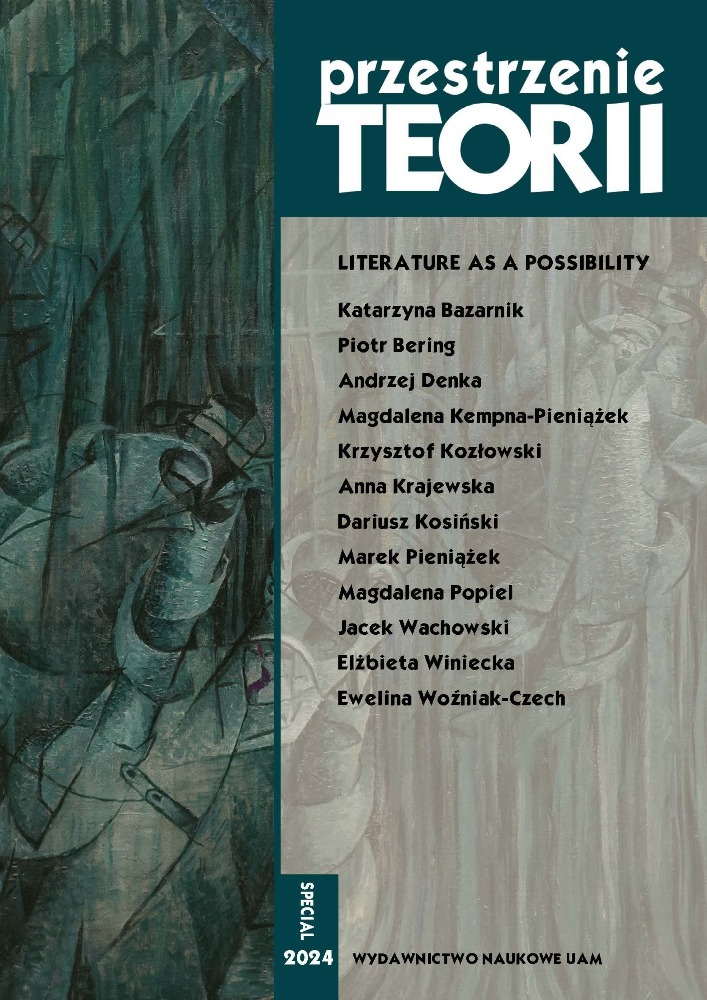Abstrakt
The article focuses on the specificity and functions of metaphors in the poetry of Radosław Jurczak, and more broadly in the work of the youngest poets, for whom life in the world of digital media and the prospect of the development of artificial intelligence is an important part of their formative experience. The paper uses the terms introduced by Mark Fisher for this purpose: the weird and the eerie. The analysis compares poetic devices in Jurczak’s poems with the concept of poetic language of the first avant-garde, pointing out the changes occurring in the poetics and aesthetics of the works, also focusing on figures relating to the technological sphere of modernity. The paper polemizes with the view expressed by Jerzy Jarzębski, who considers the phrase “artificial intelligence” to be a fashionable and harmful oxymoron that defines the pragmatic, reductionist worldview of its users. The article argues that the incorporation of terms that have the status of catachreses and over-lexicalized metaphors in everyday language into the language of poetry allows their creative potential and ambiguity to be recovered. Finally, the paper considers scaling as a characteristic feature of the new poetic imagination, which also requires readers to take a new approach to the language of the new poetry.
Bibliografia
Balcerzan E., Fragmenty o Przybosiu [On Przyboś], “Akcent” 1987, no. 1.
Czarnocka M., Mazurek M., Metafory w nauce [Metaphors in Science], “Zagadnienia Naukoznawstwa” 2012, no. 1.
Derrida J., Widma Marksa. Stan długu, praca żałoby i nowa Międzynarodówka [Specters of Marx: The State of the Debt, the Work of Mourning and the New International], trans. T. Załuski, Warszawa 2016.
Fischer M., Dziwaczne i osobliwe [The Weird and the Eerie], trans. A. Karalus, Gdańsk 2024.
Harari Y.N., Harari Argues that AI Has Hacked the Operating System of Human Civilization, “The Economist”, April 28, 2023, https://www.economist.com/by-invitation/2023/04/28/yuval-noah-harari-argues-that-ai-has-hacked-the-operating-system-of-human-civilisation (accessed: 16.06.2024).
Jarzębski J., Sztuczna inteligencja jako metafora [Artificial Intelligence as a Metaphor], “Naukowy Przegląd Dziennikarski” 2020, no. 4.
Jurczak R., Pamięć zewnętrzna [External Memory], Łódź 2016.
Jurczak R., Zakłady holenderskie [Dutch Book], Stronie Śląskie 2020.
Kuśmierek M., Jak działa ChatGPT-4 i czy jest warty swojej ceny? [How Does ChatGPT-4 Work and Is It Worth Its Price?], https://spidersweb.pl/2023/03/gpt-4-jak-dziala.html (accessed: 10.12.2023).
Kwiatkowski J., Świat poetycki Juliana Przybosia [The Poetic World of Julian Przyboś], Warszawa 1972.
Mazurkiewicz-Sułkowska J., Słowiańska terminologia techniczna (na materiale polskim, rosyjskim i bułgarskim) [Slavic Technical Terminology on Polish, Russian and Bulgarian Materials], Łódź 2014. DOI: https://doi.org/10.18778/7969-306-1
Niedziński B., Izraelski filozof: sztuczna inteligencja zhakowała system operacyjny ludzkiej cywilizacji [Israeli Philosopher: AI Has Hacked the Operating System of the Human Civilization], https://www.pap.pl/aktualnosci/news%2C1572208%2Cizraelski-filozof-sztuczna-inteligencja-zhakowala-system-operacyjny?fbclid=IwAR0EbRd7e7N3csLR6s0GfQ8RiQO4JOb15oSCal54IBlb7Rh6eF2g26PVfyE (accessed: 16.06.2024).
Nycz R., Wiersz jest “jak raca”. Juliana Przybosia poetyka oświecenia a estetyka nowoczesna [A Poem Is Like a Firework: Julian Przyboś’s Poetics of Enlightement and Modern Aesthetics], [in:] R. Nycz, Literatura jako trop rzeczywistości. Poetyka epifanii w nowoczesnej literaturze polskiej [Literature as a Trope of Reality: Epiphany Poetics in the Modern Polish Literature], Kraków 2012.
Peiper T., Metafora teraźniejszości [The Metaphor of the Present Day], “Zwrotnica” 1922, no. 3.
Przyboś J., Idea rygoru [The Idea of Rigor], “Zwrotnica” 1927, no. 12.
Sandauer A., Zebrane pisma krytyczne [Collected Critical Essays], vol. 1, Warszawa 1981.
Searle J., Can Computers Think?, [in:] Philosophy of Mind: Classical and Contemporary Readings, ed. D.J. Chalmers, Oxford 2002.
Searle J., Minds, Brains & Science: The 1984 Reith Lectures, London 1984.
Skurys J., Przyszłość jest chmurą, przyszłość jest chwytem [The Future Is a Cloud, the Future Is a Literary Device], Biblioteka. Magazyn literacki, https://www.biuroliterackie.pl/biblioteka/recenzje/przyszlosc-jest-chmura-przyszlosc-jest-chwytem/ (accessed: 10.12.2023).
Turing A.M., I.-Computing Machinery And Intelligence, “Mind” 1950, vol. 59, iss. 236, pp. 433-460, https://academic.oup.com/mind/article/LIX/236/433/986238 (accessed: 2.09.2024). DOI: https://doi.org/10.1093/mind/LIX.236.433
Wittgenstein L., Tractatus logico-philosophicus, trans. B. Wolniewicz, Warszawa 1970.
Licencja
Prawa autorskie (c) 2024 Elżbieta Winiecka

Utwór dostępny jest na licencji Creative Commons Uznanie autorstwa – Użycie niekomercyjne – Bez utworów zależnych 4.0 Międzynarodowe.
Autorzy
Autorzy tekstów przyjętych do publikacji w czasopiśmie „Przestrzeniach Teorii” są zobowiązani do wypełnienia, podpisania i odesłania na adres redakcji umowy o udzielenie nieodpłatnej licencji do utworów, z zobowiązaniem do udzielania sublicencji CC.
Zgodnie z umową, autorzy tekstów opublikowanych w czasopiśmie „Przestrzeniach Teorii” udzielają Uniwersytetowi im. Adama Mickiewicza w Poznaniu niewyłącznej i nieodpłatnej licencji oraz zezwalą na użycie sublicencji Creative Commons Attribution-NonCommercial-NoDerivatives 4.0 International (CC BY-NC-ND 4.0).
Autorzy zachowują prawa do dalszego, swobodnego rozporządzania utworem.
Autorzy, którzy wykorzystują w swoim tekście cudze utwory (np. ilustracje, fotografie) proszeni są o dostarczenie do redakcji czasopisma zgodę na publikację od uprawnionych podmiotów.
Użytkownicy
Zainteresowani użytkownicy internetu uprawnieni są do korzystania z utworów opublikowanych po 2015 roku „Przestrzeniach Teorii” tylko w calach niekomercyjnych, pod następującymi warunkami:
- uznanie autorstwa - obowiązek podania wraz z rozpowszechnionym utworem, informacji, o autorstwie, tytule, źródle (odnośniki do oryginalnego utworu, DOI) oraz samej licencji;
- bez tworzenia utworów zależnych - utwór musi być zachowany w oryginalnej postaci, nie można bez zgody twórcy rozpowszechniać np. tłumaczeń, opracowań.
Do wszystkich tekstów opublikowanych przed 2015 r. prawa autorskie są zastrzeżone.
Inne
Uniwersytet im. Adama Mickiewicza w Poznaniu zachowuje prawo do czasopisma jako całości (układ, forma graficzna, tytuł, projekt okładki, logo itp.).

